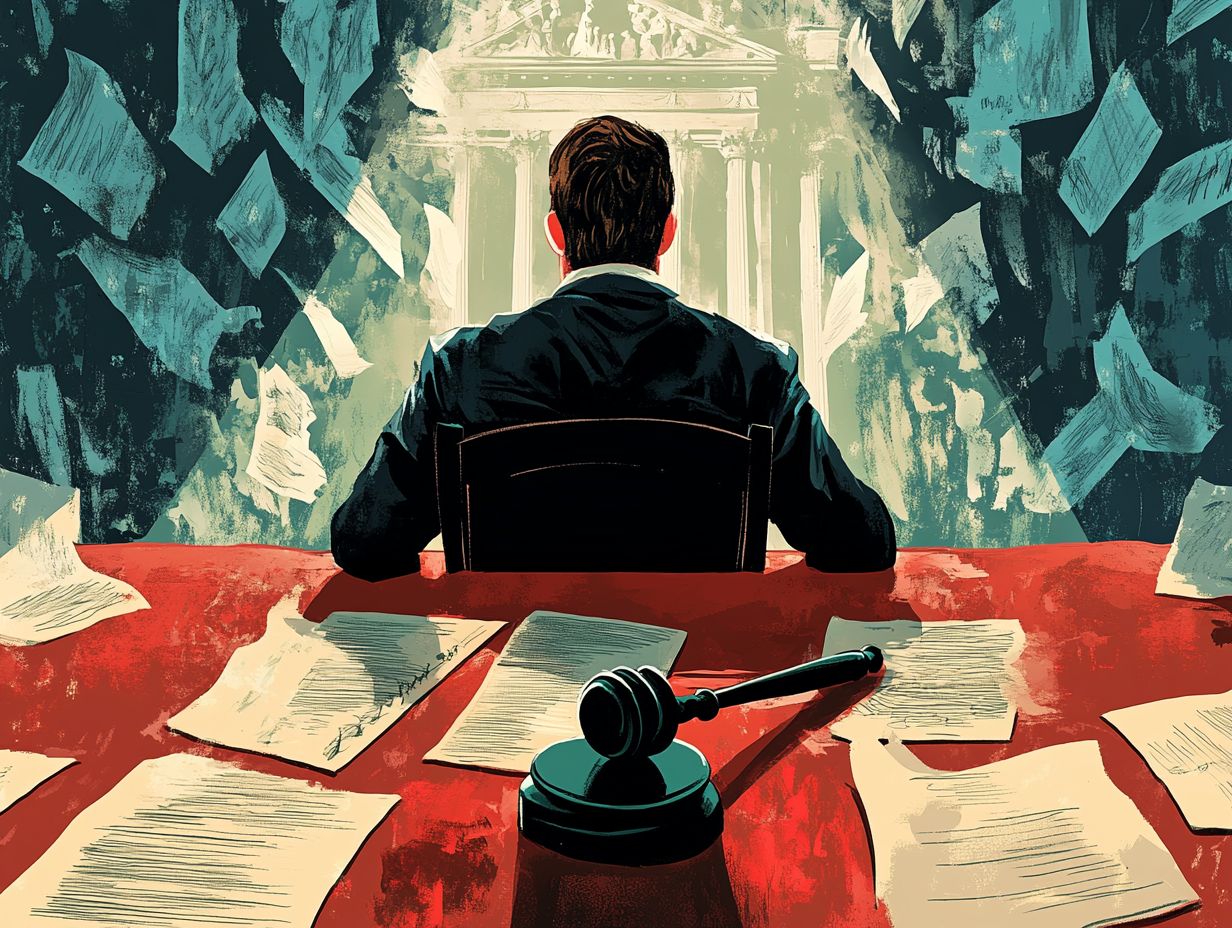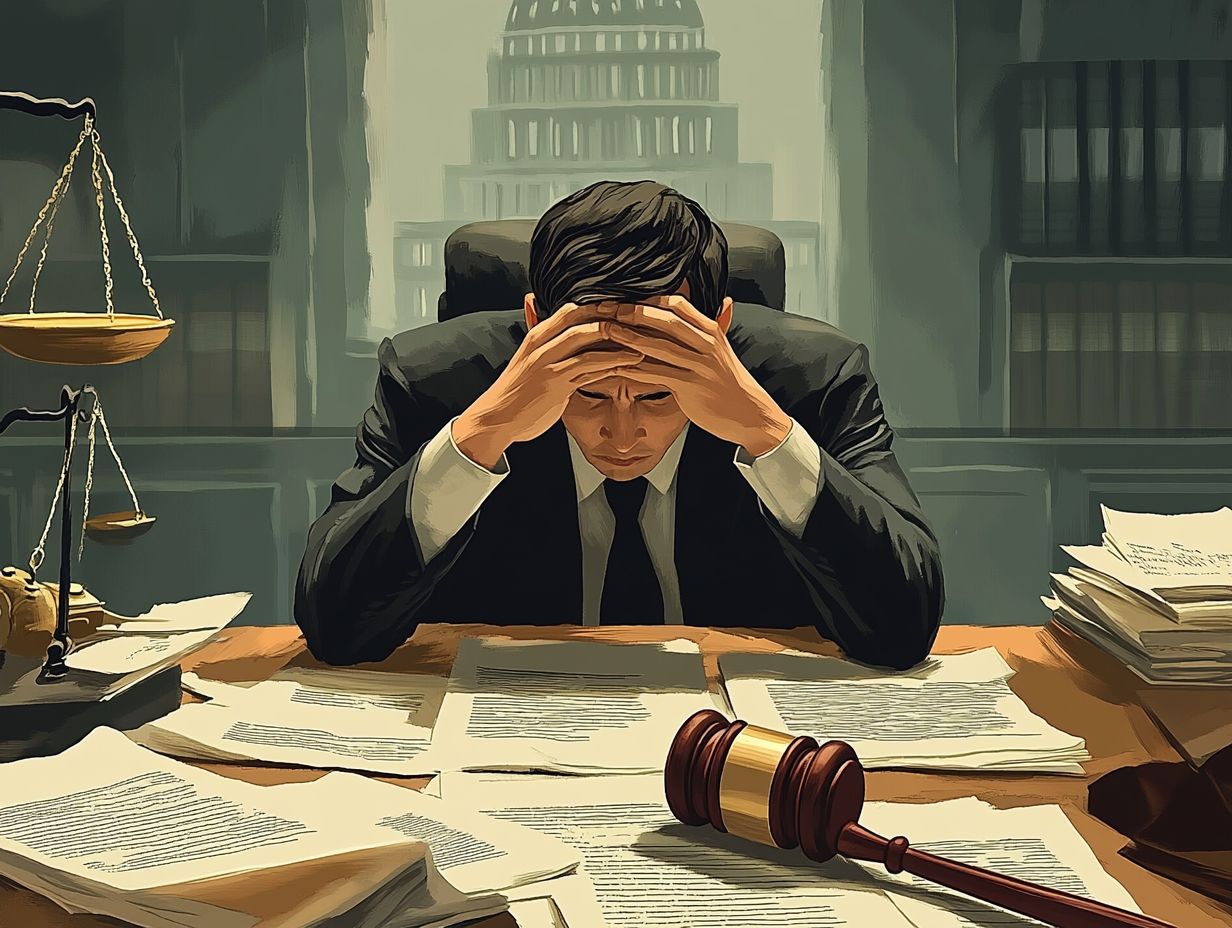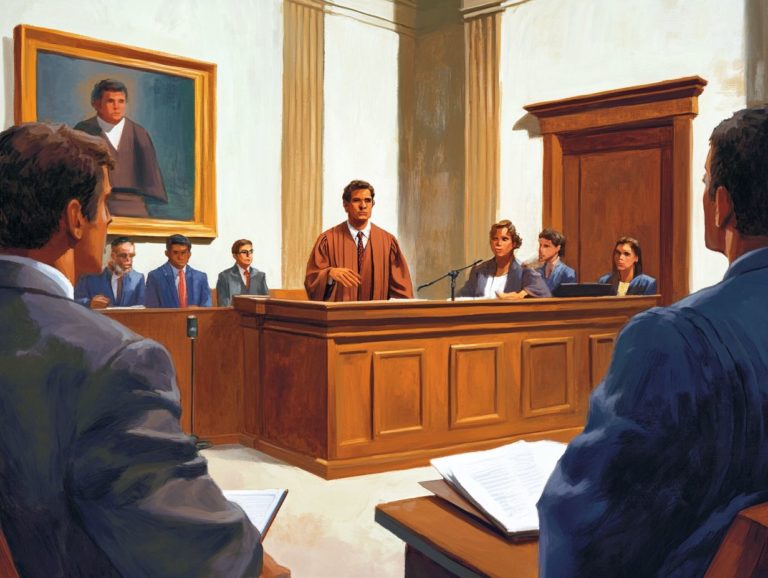Can You Appeal a Criminal Conviction?
Navigating the complexities of the criminal justice system can feel overwhelming, particularly when you re facing a conviction.
This article delves into the intricacies of criminal convictions, helping you understand what they encompass, the various types, and the essential process of appealing a conviction. It outlines the grounds for appeal, the timeline you can expect, and the crucial factors you must weigh before taking action.
This piece also explores potential outcomes and alternatives, such as pardons. Whether you re personally involved in the situation or simply intrigued by the process, this guide aims to provide you with clarity and valuable insights.
Contents
Key Takeaways:

- A criminal conviction can be appealed if there are errors in legal procedures or new evidence.
- The appeal process and timeline differ by state but generally requires filing a notice of appeal.
- Consult a legal expert to assess the strengths of your case before appealing.
Understanding Criminal Convictions
It s vital to understand criminal convictions when dealing with the legal system, especially in states like Wisconsin, where different types of convictions can profoundly affect an individual s rights and future.
A criminal conviction can stem from various cases, including felonies and misdemeanors, each carrying distinct consequences and implications. This process typically involves a trial, where arguments and evidence are scrutinized, ultimately leading to a court judgment.
Engaging an experienced attorney can help you navigate the complexities of these convictions, offering legal representation for those pursuing relief from unjust outcomes.
Definition and Types of Convictions
In Wisconsin, a criminal conviction is a legal judgment that designates you as guilty of a crime, which can fall into either the felony or misdemeanor category. This classification is crucial for grasping the severity and implications of the offense.
Felonies are serious crimes, often resulting in imprisonment for over a year. Misdemeanors, on the other hand, are lesser offenses with penalties generally confined to less than a year in county jail or fines.
Wisconsin recognizes a variety of convictions, including civil forfeitures where the government seizes property connected to illegal activities and certain Operating While Intoxicated (OWI) violations, each carrying its own set of legal consequences. A conviction can have far-reaching effects on your civil rights, employment opportunities, and overall reputation.
This underscores the importance of understanding the type of crime and the legal ramifications that accompany it.
Appealing a Criminal Conviction
Appealing a criminal conviction is a legal journey through which you challenge the trial court’s decision, seeking relief from a judgment you believe is flawed or unjust. You ll often need an experienced attorney to guide you through this process.
This process typically begins with the filing of a notice of appeal, followed by formulating compelling arguments and a brief that clearly outlines the grounds for contesting the conviction.
Every step in this meticulous process must comply with strict legal protocols to ensure that your rights are fully represented and protected during the appellate court’s review.
Grounds for Appeal

In criminal cases, grounds for appeal typically hinge on significant errors that occurred during the trial, potentially skewing the outcome against you. These errors can stem from various sources, such as illegal evidentiary rulings, jury misconduct, or even missteps by your legal counsel. Such factors can seriously undermine the fairness of the trial process.
Moreover, the emergence of new evidence that wasn’t available during your initial trial can provide a compelling basis for appeal. It’s essential for you to enlist a knowledgeable attorney who can accurately pinpoint these grounds and craft a persuasive argument tailored for the appellate court, ensuring that every legal nuance is thoroughly examined and articulated.
Process and Timeline
The appeal process involves several critical steps that you must follow within a specified timeline. This ensures that all motions, hearings, and filings meet court requirements.
It all begins with filing a notice of appeal. You typically have a limited window usually 30 days to start this process after the court’s decision.
Once you’ve filed this notice, the next step is to prepare the record on appeal. This means compiling all relevant documents and transcripts. This stage can take several weeks, depending on the court and the complexity of your case.
Following this, you need to submit a written brief that clearly articulates the grounds for your appeal. This often requires careful legal research and analysis to make your argument as compelling as possible.
The opposing party will have the chance to file their brief, which will extend the timeline. Once both parties have submitted their briefs, the appellate court will schedule oral arguments. This is an essential part of the process where lawyers present their cases and respond to questions from the judges.
After all these steps, the court will deliberate before issuing its final decision. This process can vary in duration, emphasizing the importance of adhering to all deadlines throughout.
Factors to Consider Before Appealing
Before you decide to pursue an appeal, it s essential to thoughtfully consider several key factors.
This includes evaluating the strength of the evidence presented during the trial and assessing the quality of legal counsel available for your representation.
Strength of Evidence and Legal Counsel
The strength of the evidence presented at trial is crucial when deciding whether to pursue an appeal. The quality of legal counsel you choose is also important throughout the process.
When assessing the merits of your potential appeal, consider how the evidence was obtained, its relevance, and its impact on the initial verdict. Quality evidence not only reinforces your case but can also influence the decisions made by appellate courts.
For anyone contemplating an appeal, securing experienced legal counsel is vital. Seasoned attorneys understand the complexities of appellate law, which deals with reviews of trial court decisions, and excel at evaluating the strengths and weaknesses of your evidence. Their expertise is invaluable in crafting the most effective strategy.
Selecting attorneys who specialize in criminal appeals provides insight into successful past cases and a deep understanding of legal precedent. This significantly enhances your chances of achieving a favorable outcome.
Potential Outcomes of an Appeal

The potential outcomes of a criminal appeal can fluctuate significantly. You may face a reversal of the original conviction, a retrial in the lower court, or even a complete dismissal of charges.
These possibilities depend on the arguments you present and the errors identified in the original trial.
Reversal, Retrial, or Dismissal
In the realm of criminal appeals, your case could lead to a reversal of the conviction, a retrial, or even a complete dismissal of charges. Each of these outcomes carries distinct legal implications for everyone involved.
When the appellate court decides on a reversal, it clearly recognizes that errors occurred during the initial trial errors that impacted the verdict. This might be your ticket to freedom.
A retrial offers a fresh opportunity for both sides. The prosecution will need to gather new evidence, while you can refine your defense strategy based on lessons learned from the first trial.
If charges are dismissed entirely often due to procedural missteps or insufficient evidence the implications reach beyond just you and the prosecution. It may also put significant strain on the prosecution s resources and credibility.
Understanding these potential outcomes is vital for you as the defendant, as well as for the prosecution, to effectively navigate the intricate legal landscape ahead.
Alternatives to Appealing
When you’re dissatisfied with a criminal conviction, there are alternatives to consider beyond just appealing.
Options like seeking a pardon or a commutation of sentence can offer you legal relief without the intricate complexities that often accompany the appellate process.
Pardon or Commutation of Sentence
A pardon clears your conviction. A commutation reduces your punishment but doesn’t erase the conviction.
The ways to get these legal remedies differ by location. Each area has specific criteria you must meet before applying.
You often need to show proof of rehabilitation and maintain a clean record since your offense. Sometimes, gathering community support is also necessary.
Getting a pardon or commutation can change your life in amazing ways. It can significantly improve your job prospects and restore your civil rights.
For instance, a former inmate transformed their life after receiving a pardon. This allowed them to vote again and find meaningful work in a stable job market.
Frequently Asked Questions

Can You Appeal a Criminal Conviction?
Yes, you can appeal a criminal conviction. An appeal asks a higher court to review a decision made by a lower court.
What is the process for appealing a criminal conviction?
The appeal process varies by jurisdiction. It usually involves filing a notice of appeal and submitting a written brief that outlines why you believe the decision should be changed.
What are some common grounds for appeal?
Common grounds for appeal include legal errors, new evidence, or misconduct by the prosecutor or jury.
Can you appeal a criminal conviction if you pled guilty?
You can appeal even after pleading guilty. However, your grounds for appeal may be limited since pleading guilty often waives your right to challenge the evidence.
Is there a time limit for appealing a criminal conviction?
Yes, there is usually a time limit called the statute of limitations. This limit varies by jurisdiction, so check the laws in your area.
What happens if you win your appeal?
If you win, your conviction may be overturned, or a new trial may be ordered. The higher court could also acquit you, removing the conviction from your record.






